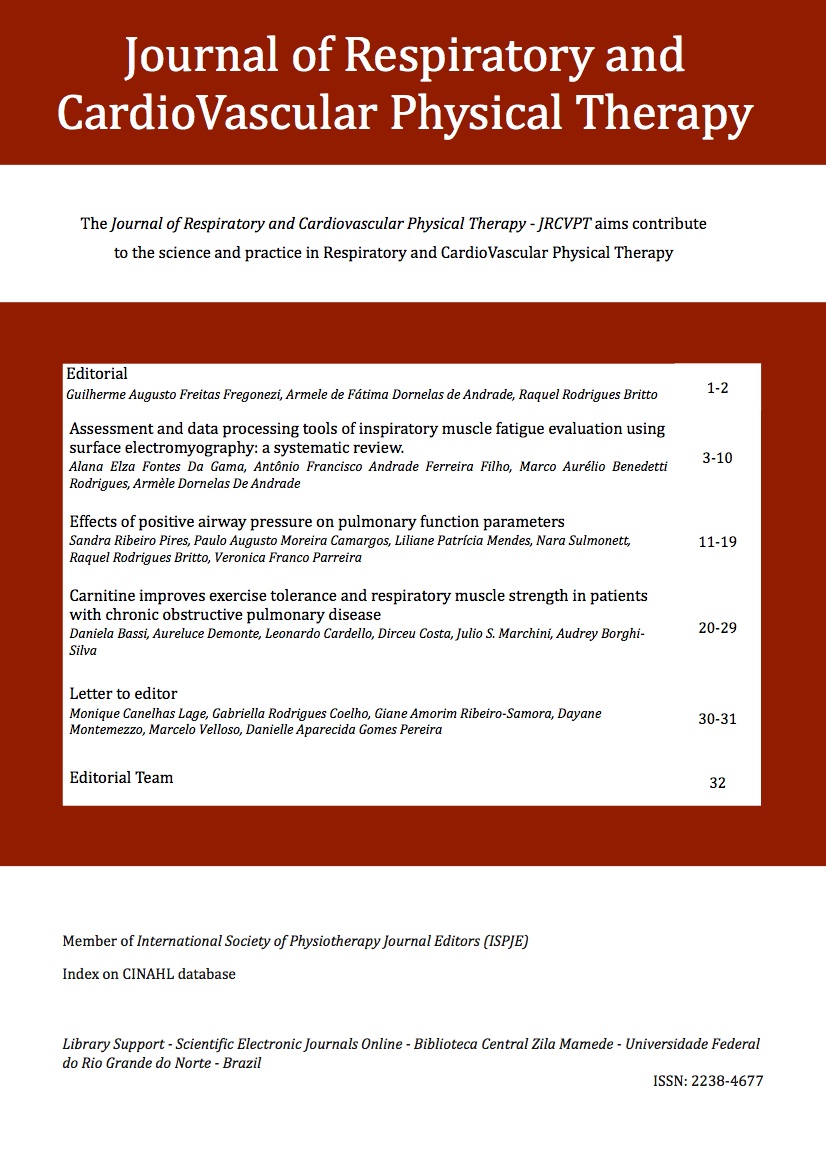Carnitine improves exercise tolerance and respiratory muscle strength in patients with chronic obstructive pulmonary disease
Mots-clés :
COPD, L-Carnitine, Respiratory muscle strength, Exercise, Dietary supplements.Résumé
Objective: We evaluated the safety and effects of L-carnitine on exercise capacity and respiratory muscle strength in patients with chronic obstructive pulmonary disease (COPD).
Methods: Prospective double blind study. Thirty four patients were screened; however, only 8 completed the study. Elderly men with COPD (70±4 years) participated of incremental and submaximal exercise testing, maximal inspiratory (PImax) and expiratory pressures (PEmax) and blood sample analysis to determine plasmatic free L-carnitine. Protocols consisted of placebo supplementation during the first 6 weeks (glucose solution in 2 daily doses) and L-carnitine supplementation (two times a day, i.e., 2 g daily in water solution) after more 6 weeks. Patients did not know if they were receiving glucose (placebo) or carnitine. Patients were evaluated before and after placebo and supplementation. Data were analyzed by repeated measures analysis (ANOVA). Delta of change was compared by Student t test. Correlations between deltas of walking distance, PImax with plasmatic free L-carnitine were performed by Pearson’s test.
Results: Placebo did not change plasmatic free L-carnitine, exercise capacity and pulmonary function. However, after 6 weeks of L-carnitine supplementation, plasmatic free L-carnitine (from 56±9 to 87±16?Mol/L), submaximal exercise (from 446±47 to 498±35m), PImax (from 56±13 to 74±10cmH2O) and PEmax (from 65±12 to 85±12cmH2O) significantly improved. Significant correlation was found between PImax and plasmatic free L-carnitine (r=0.65 and p=0.04). In addition, during L-carnitine supplementation no signals of intolerance or collateral effects were observed.
Conclusion: L-carnitine supplementation appeared to be safe, well-tolerated and positively influenced exercise capacity and respiratory muscle strength in COPD patients.
Téléchargements
Téléchargements
Publié-e
Comment citer
Numéro
Rubrique
Licence
Copyright Transfer Statement
The author(s) of the article, as specified here, hereby transfer(s) to the Revista de Fisioterapia Respirtória e CardioVascular (Journal of Respiratory and CardioVascular Physical Therapy) all copyright ownership rights, title and interests that the author(s) may have or may come to have in and to the article and any revision or version thereof, including, but not limited to, exclusive right to print, publish and sell the article anywhere in the world, in any language and in any media.
This agreement will be considered effective and valid if and when the article is accepted for publication.
If the article contains any copyright-protected material from a third party, the author(s) must obtain written permission to reproduce the said material in the article from the copyright holder and send it to the Revista de Fisioterapia Respirtória e CardioVascular (Journal of Respiratory and CardioVascular Physical Therapy).
The author(s) guarantee(s) the holding of proprietary rights to the article; not having granted or transferred any rights to the article to any other persons or entity; that the article is susceptible to the demand for rights by its author(s); not having infringed upon any author rights, trademark or patent; not having violated the right to privacy or publicity of any person or entity; that the article does not contain any defaming subject; that the factual statements made are true or are based on reasonably accurate research; and, finally, that, the author(s) has/have no reason to believe that any of the formulas, procedures or prescriptions contained in the article will cause damage if used or followed in accordance with the instructions and warnings contained in the article.
The author(s) will indemnify the Revista de Fisioterapia Respirtória e CardioVascular (Journal of Respiratory and CardioVascular Physical Therapy) against any costs, expenses, damages or liability that the Revista de Fisioterapia Respirtória e CardioVascular (Journal of Respiratory and CardioVascular Physical Therapy) may incur as a result of accidental omissions of these guarantees. These representations and guarantees may be extended to a third party by the Revista de Fisioterapia Respirtória e CardioVascular (Journal of Respiratory and CardioVascular Physical Therapy).
Date:
Note: Each author must individually complete and sign this form
1) Author:
Signature: _________________________________
2) Author:
Signature: _________________________________
3) Author:
Signature: _________________________________
4) Author:
Signature: _________________________________
5) Author:
Signature: _________________________________
6) Author:
Signature: _________________________________
7) Author:
Signature: _________________________________
8) Author:
Signature: _________________________________




 English
English Español (España)
Español (España) Português (Brasil)
Português (Brasil) Français (Canada)
Français (Canada)